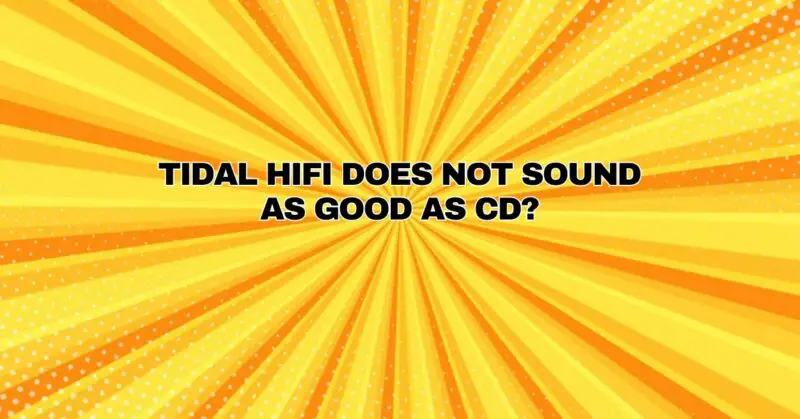The realm of high-quality audio streaming services has witnessed a surge in popularity as music enthusiasts seek the best possible listening experience. Tidal, known for its commitment to lossless, high-fidelity sound, has positioned itself as a go-to option for audiophiles. However, a persistent question remains: Does Tidal HiFi truly measure up to the audio quality of a standard CD? In this comprehensive article, we will delve into the nuances of Tidal HiFi and CD quality audio, examining the factors that affect their sonic differences and whether one genuinely outperforms the other.
Understanding Tidal HiFi
Tidal HiFi is a premium subscription tier offered by Tidal, a music streaming service renowned for its dedication to high-fidelity sound. Tidal HiFi provides subscribers with access to a vast library of songs in FLAC (Free Lossless Audio Codec) format, which is a lossless audio compression format known for preserving audio quality. The streams are delivered at a bitrate of 1411 kbps, equivalent to CD quality.
The Allure of CD Quality
Compact Discs, or CDs, have long been considered the benchmark for high-quality audio. A standard audio CD contains uncompressed audio in the form of PCM (Pulse Code Modulation) at a 16-bit depth and a 44.1 kHz sampling rate. This format offers a pristine representation of the original recording, devoid of any compression or loss of audio data.
Factors Affecting the Comparison
When comparing Tidal HiFi to CD quality audio, several factors must be taken into account:
- Listening Equipment: The quality of the audio playback equipment, including speakers or headphones, amplifiers, and digital-to-analog converters (DACs), plays a significant role in perceiving differences in audio quality.
- Listening Environment: The acoustics of the room, ambient noise, and the position of the listener can influence how audio is perceived. A controlled listening environment is essential for accurate comparisons.
- Source Material: The source material’s recording quality and mastering can vary significantly, impacting the overall listening experience. Well-mastered tracks will sound better, regardless of the format.
- Personal Preferences: Ultimately, audio quality is subjective and can vary from person to person. Some individuals may prefer the characteristics of one format over another.
The Nuances of Tidal HiFi vs. CD Quality
Tidal HiFi offers audio streams at a bitrate equivalent to CD quality, ensuring a level of audio fidelity that rivals physical CDs. In many cases, listeners may find it challenging to distinguish between Tidal HiFi and CD quality audio, especially when using high-quality equipment and in optimal listening conditions.
However, there are subtle differences that discerning audiophiles may notice:
- Mastering Variations: Some albums available on Tidal HiFi may have different mastering compared to their CD counterparts, which can result in nuanced differences in sound.
- Listening Environment: The listening environment can significantly impact perceived audio quality. Audiophiles often invest in sound-treated rooms to eliminate external factors that can affect their listening experience.
- Preference for Physical Media: Some audiophiles have a preference for physical media, such as CDs or vinyl records, as they enjoy the tactile experience and believe it offers a more authentic connection to the music.
Conclusion
The comparison between Tidal HiFi and CD quality audio is a nuanced and subjective one. While Tidal HiFi offers streams at a bitrate equivalent to CD quality, the subtle differences in mastering, listening environments, and personal preferences can influence how listeners perceive the audio quality.
For many music enthusiasts, Tidal HiFi provides a convenient and high-quality way to access a vast library of lossless audio. The format’s convenience, along with the advancement of high-quality audio equipment, has blurred the lines between streaming and physical media for many listeners.
Ultimately, whether Tidal HiFi sounds as good as CD quality is a matter of personal preference and the listening conditions in which the music is enjoyed. Both formats offer excellent audio quality, and the choice between them often comes down to convenience, accessibility, and individual preferences in the digital age of music consumption.


